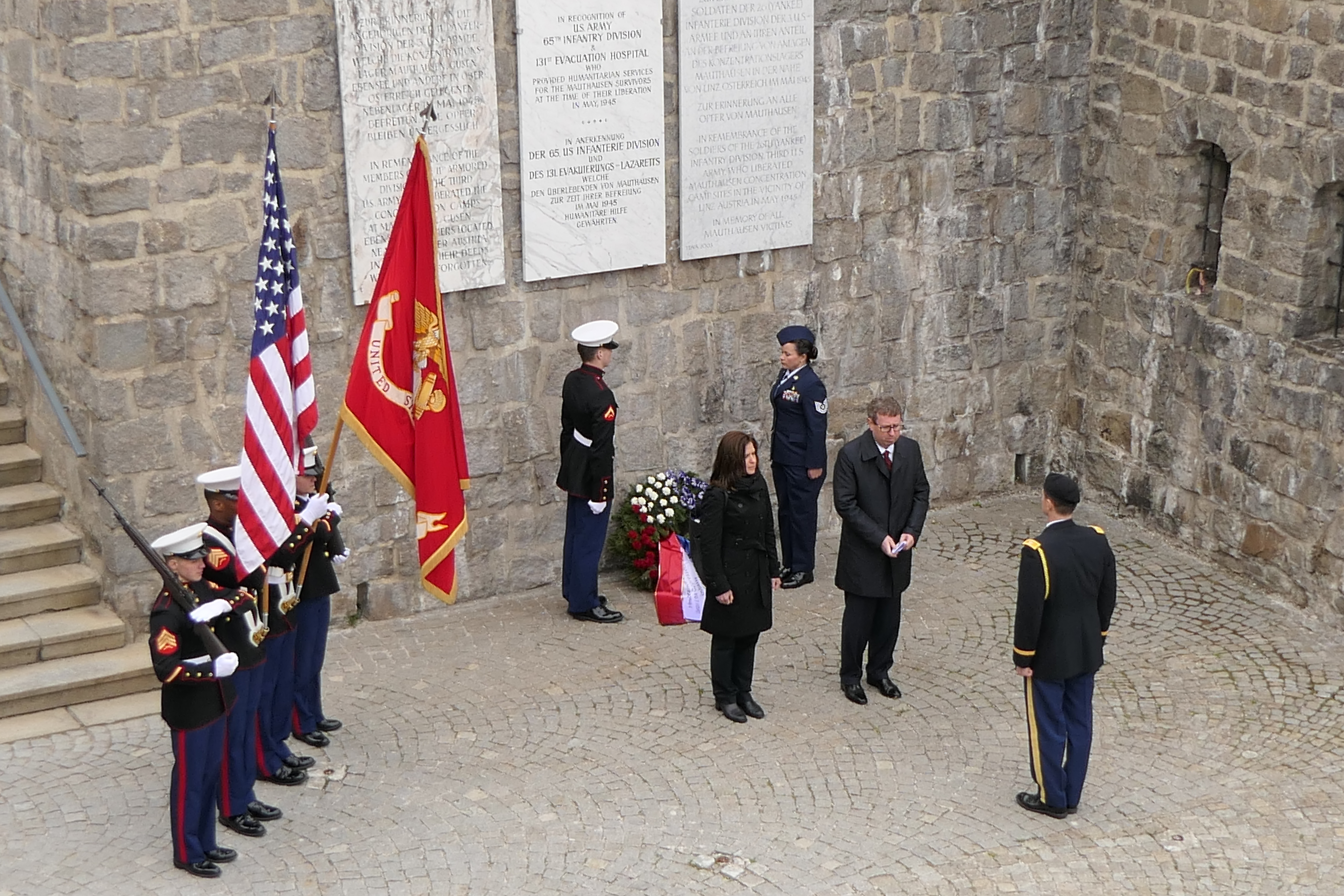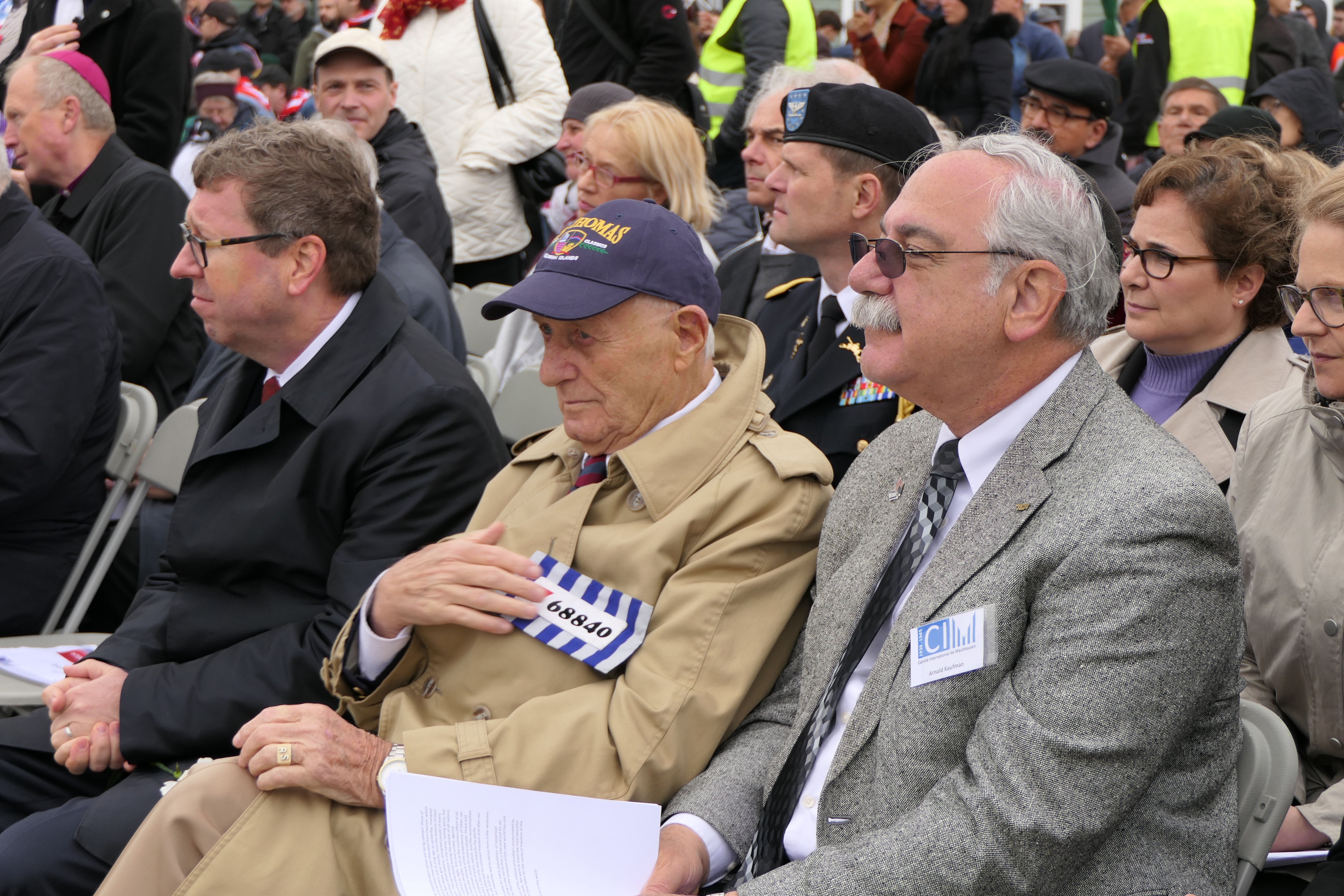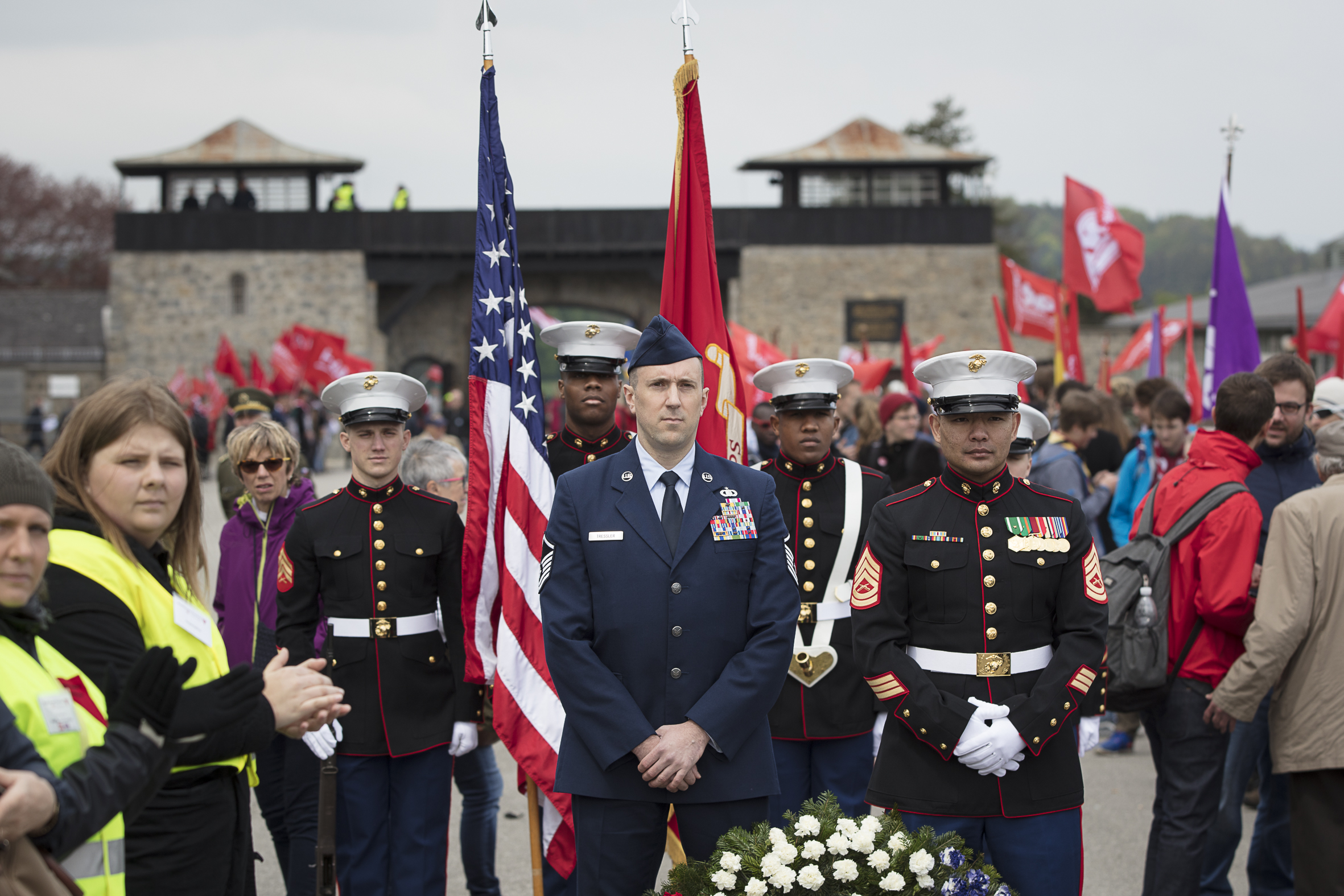Dec 2017
Internationality Unites (Mauthausen)
On the 72nd Anniversary of Liberation
by Anna Rosmus
Immigrants rarely tend to choose either origin or current status. Most are happy to combine their strengths from before and after migrating. As new identities are forged, multiple aspects from their personal lives play as much a role as political and social circumstances surrounding them.
Mutli-ethnic entities might not be so different after all. A constant exchange of views allows individuals to re-evaluate their positions on an ongoing basis, to find mutual ground and to move on.
Instead of attending the annual Correspondents’ Association dinner at the White House, however, the American tycoon-turned-president Donald Trump held a “big rally” in Pennsylvania.
Having condemned Barack Obama for taking vacations during his presidency, Trump quickly referred to Mar-A-Lago in West Palm Beach, Florida as his “Winter White House”. Not only did he spend 11 of his first 33 days in office but St. Patrick’s Day marked the fifth time Trump visited. Chris Riotta suggested “Call him the snowbird president”.
Although the President spoke on Holocaust Memorial Day, a subsequent headline read: “Donald Trump freezes funding to groups fighting right-wing terror and white supremacism”.
A wide variety of Trump contradictions dominated not only discussions among news anchors but also corporate offices, lawyers and private residents here and abroad.
In his January inauguration speech, Trump made a seemingly straightforward pledge: “We will follow two simple rules: buy American and hire American.” Before long, however, AFP ousted his daughter as the exception, and Business of Fashion headlined a report: “Amidst Backlash, Ivanka Trump Clothing Is Secretly Relabelled as Adrienne Vittadini”. After meeting President Xi Jinping, the President even backed away from his rough campaign talk about trade with China, and another headline read, “Trump and Kushner exploitation of presidency ‘unlike anything we have ever seen before’…”.
To keep out undocumented immigrants and drug smugglers, one of Trump’s central campaign promises was to build a “big, beautiful, powerful wall” along the 2,200-mile border with Mexico. An estimated 1 million patients flocking there each year catapulted that nation not only among the world leaders in medical tourism, but ironically also among a Republican bill’s biggest beneficiaries. More than 350 dentists in Los Algodones earned the small Mexican town the nickname “Molar City.” Many patients come from the U.S., where rising medical costs and a new federal health care law might leave twenty-three million fewer Americans insured by 2026.
Perhaps it is no surprise then that homeland security secretary John F. Kelly indicated the actual wall will not reach “from sea to shining sea”. Instead of an estimated $21.6 billion, Trump requested only $1,6 billion. As the administration is reviewing prototype bids, some proposals are mocking the premise itself while another features a sheet of wire and plexiglass, resembling a one-way mirror.
Although relentlessly mocking and criticizing German Chancellor Angela Merkel during his campaign, calling her open-door stance toward Syrian refugees a “catastrophic mistake”, Trump received her in the Oval Office. Afterwards, he ignored photographers asking for the two to shake hands afterwards, and Yahoo picked up that “Angela Merkel reportedly had to explain the ‘fundamentals’ of EU trade to Trump 11 times”. Nonetheless, Trump assured the press that it was not only a “very good” meeting but “one of the best chemistries” he had with any foreign leader.
The president’s nine-day trip to the Middle East and Western Europe emphasized on US leadership. It began with the centers of the world’s three largest monotheistic religions. The New York Times wrote about Trump thinking that the trip is too long, and him not wanting to be away from familiar settings, including his own bed. A White House official pointed out that Ivanka and Jared Kushner joined the President on Air Force One with a rabbinical dispensation to travel on the Jewish Sabbath. Politico reminded readers that for Inauguration Day, the couple had received the same kind of rabbinical pass to travel by car. Yahoo wondered whether Melania Trump, “the former-model-turned-FLOTUS may have to tone down her high-end wardrobe, which includes spiky stilettos, colorful patterns, and clothes by American designers .… She may also have to adhere to the country’s strict dress code for women: long sleeves, ankle-length dresses (no pants), and headscarves.”
Rep. Ted Lieu (D-California), a Member of the House Foreign Affairs Committee, sheepishly tweeted Trump a cheat sheet. After “DON’T leak classified information,” he reminded him that Israel is an ally of the U.S., whereas Russia is not, that the G7 summit in Sicily “is NOT a Golf reference” and Pope Francis “knows climate change is real, hates your proposed wall and is not a fan of locker room talk.”
And as if that were not embarrassing enough, a Sasha Lekach headline read “Trump’s first foreign trip is already a disaster and it hasn’t even started”.
National Public Radio quoted Trump: “Until the oil went down, Saudi Arabia was making a billion dollars a day. We protect them. We protect them. And we protect them for peanuts. So all of that stuff is going to change folks.” For Trump to visit where ultra-conservative Wahhabism rules life, Stephen Miller, known for his anti-Muslim rhetoric and credited as one of the chief architects of Trump’s failed travel ban, penned the president’s speech about radical Islam. The Guardian noted that the “most anticipated address of Trump’s chaotic six months in office” was followed by a men-only concert of country star Toby Keith – known for hits such as “I Like Girls that Drink Beer” and “The Angry American”. The Associated Press added that steak with ketchup was “part of a worldwide effort to accommodate America’s homebody president”. And although Trump walked away smiling, with one of the biggest weapons deals in history, another commentator concluded he “was bedazzled by the kingdom’s hospitality, but none of the Saudi opulence and money can whitewash Saudi Arabia’s terrible record of fueling Wahhabi terrorism, carrying out record numbers of public beheadings, contributing to famine in Yemen, and withholding many basic rights for Saudi women and girls.”
Newsweek announced the President’s speech atop the ancient mountaintop fortress of Masada in Israel was scrapped because Trump wouldn’t take a cable car. The Jewish Forward wondered, “Is 15 minutes enough time for Trump at Yad Vashem?”, the Holocaust Remembrance Museum in Jerusalem.
The Pope presented Trump a copy of his 2015 encyclical to protect the environment.
Having called NATO obsolete, some wondered whether it can “Survive a Donald Trump Presidency?“ As Chris Bryant pondered the $65 billion U.S. trade deficit with Germany, he figured “When they want Donald Trump to grasp a topic, his advisers have learned to keep things simple.” One of the most watched scenes, however, unfolded at the NATO headquarters in Brussels, where the US President was filmed shoving the Prime Minister of Montenegro aside to stand up front. It may not have come as a complete surprise that Trump did not explicitly support Article 5 in his remarks.
With more than half a million refugees, most from sub-Saharan Africa, having reached Italy by boat since 2014, Italians chose to hold the G7 summit in Sicily. After discussing the landmark Paris Climate Accord with European leaders, Trump’s top economic adviser stated, “He came here to learn, he came here to get smarter.” AP noted that the President’s views were “evolving”, but just as another crack in one ice shelf was growing 11 miles in six days, Trump announced America’s withdrawal.
The New York Times reported that after the inauguration former FBI Director James Comey “who is 6 feet 8 inches tall and was wearing a dark blue suit” tried to blend into curtains hoping that Trump might not spot him. After Trump fired Comey, Benjamin Wittes, a senior fellow at the Brookings Institution, told PBS NewsHour, that “the most dangerous thing in the world, if you’re Donald Trump, is a person who tells the truth, is dogged, you can’t control, and who is as committed as Comey is to the institutional independence of an organization that has the power to investigate you.”
When a poll asked people for the first word coming to mind about Trump, Yahoo headlined “the results were brutal”. Magazine covers continued to feature glaring Trump scenarios.
The Fiscal Times reasoned that “instead of gravitas, the world was treated to goofiness. Instead of respect, foreign leaders were met with rudeness; and rather than growth, Trump demonstrated something like arrested development.”
In March, The New York Times opened an article with “The ninth week of Donald Trump’s presidency began with the F.B.I. director calling him a liar.” Susan E. Rice, a former national security adviser and U.S. representative to the United Nations, warned in The Washington Post, that “false statements from the White House are part of a disturbing pattern of behavior that poses real and potentially profound dangers to U.S. national security. The foundation of the United States’ unrivaled global leadership … is also grounded in the perception that the United States is steady, rational and fact-based. To lead effectively, the United States must maintain respect and trust.”
Even the traditionally conservative Wall Street Journal began an article with the following remarks: “If President Trump announces that North Korea launched a missile that landed within 100 miles of Hawaii, would most Americans believe him? Would the rest of the world? We’re not sure, which speaks to the damage that Mr. Trump is doing to his Presidency with his seemingly endless stream of exaggerations, evidence-free accusations, implausible denials and other falsehoods….”
When conservative Pulitzer Prize-winning columnist George F. Will wrote that the dangerous thing is that Trump “does not know what it is to know something”, he suggested “it is up to the public to quarantine this presidency by insistently communicating to its elected representatives a steady, rational fear of this man whose combination of impulsivity and credulity render him uniquely unfit to take the nation into a military conflict.”
By the time Der Spiegel, one of the most influential magazines in Europe, chimed in, “Trump has to be removed from the White House. Quickly. He is a danger to the world”, Yahoo had already hinted at members of congress “holding secret conversations about removing Donald Trump from office”. While some Americans concluded that Trump has to be impeached, others wondered whether he might resign instead.
Rick Newman concluded that “Trump is the wrong kind of businessperson to be president … It would be interesting to see how a public-company CEO fares in the White House. Compared with one not accustomed to such accountability.”
Americans were quick to take matters in their own hands. After Trump signed an executive order to temporarily halt citizens from Iran, Iraq, Libya, Somalia, Sudan, Syria, and Yemen from entering the US, some began to see the headscarf as a symbol of solidarity. Nike debuted a Pro Hijab for female athletes, and Hijarbie, a Barbie doll that wears a hijab, became an Instagram hit.
Outgoing Starbucks CEO Howard Schultz pointed out “We have a long history of hiring young people looking for opportunities and a pathway to a new life …. There are more than 65 million citizens of the world recognized as refugees by the United Nations, and we are developing plans to hire 10,000 of them over five years in the 75 countries around the world where Starbucks does business. And we will start this effort here in the U.S. by making the initial focus of our hiring efforts on those individuals who have served with U.S. troops as interpreters and support personnel in the various countries where our military has asked for such support.” Sure enough, some on social media called for a boycott of that company.
One week after US-cities and states pledged to uphold the Paris obligations, CNN reported that 64 members of Congress have asked the House Appropriations Committee to ignore Trump’s suggested $3 million cut to the United States Holocaust Memorial Museum.
In Mexico, a lawyer is marketing Trump-branded toilet paper to support migrants and Mexicans deported from the U.S.
The German Chancellor announced that the days when Europe could completely count on others were not only “over to a certain extent”, but Europeans must really take their fate into their own hands.
One US-writer observed, “if the Europeans are frightened, conversations with key diplomats here don’t reflect it. First, they think the president is more tweeter than tough guy, … and … their sophisticated contacts with key officials and members of Congress allow them to reassure themselves that, whatever Trump’s bluster, the alliance will sail on ….” Indeed, many Europeans do believe in the endurance of their established relationships with U.S. institutions.
In Austria, where time is frequently measured in centuries, and contentment and stamina may occasionally seem one and the same, things are perceived less dramatically. Except for interruptions during WWI and WWII, diplomatic relations with the United States have continued since 1838. The embassy is located in Vienna. Because a new ambassador has not yet been appointed, Eugene Young fills ceremonial gaps. His most recent diplomatic assignment was as Consul and U.S. Senior Civilian Representative at the U.S. Consulate in Herat, Afghanistan. Remaining calm, and not fussing over minute non-issues might be in his nature.
On May 8, 1945 Allied troops defeated the National Socialist regime and the German army surrendered unconditionally. Traditionally, the Mauthausen Committee Austria (MKÖ) considers May 8th to be not only a day of joy but it commemorates those millions who were persecuted. It remembers those who refused military service, who participated in acts of resistance or fought alongside the Allies to help liberate the country. And because more than 90% of the victims of the Mauthausen Concentration Camp were neither Germans nor Austrians, internationality holds particular significance.
Spring events celebrating VE-Day and the liberation tend to reflect a solid cooperation. Albert Langanke, former MKÖ Secretary General, explained, “As liberators of the Mauthausen concentration camp, US troops have always had a particular meaning to former inmates, and naturally as well to MKÖ, CIM and many more. How things will evolve now, we will see.”
While Willi Mernyi, Chair of the Mauthausen Committee Austria, freely admits that the steady changing of ambassadors does pose problems regarding continuity, he points out the institution’s “good connections to the permanent staff at the Embassy. For many, many years, we have closely and willingly cooperated with the US embassy. They support us where they can, and they are present at each liberation celebration. Also, we already have realized mutual book projects about the liberation resp. about our perspective of the USA.”
For more than 15 years, mutual activities before every US election have engaged thousands of diverse juveniles in Austria.
Another indication of recognition by the US Embassy was to host Christa Bauer (MKÖ) as a formal visitor of the USA in 2015.
For the 72nd anniversary of liberation, some 80 events throughout Austria represented the largest series of memorial events of their kind. More than 4,000 people gathered in Vienna. where Eugene Young and others addressed the crowd via video-taped opening statements.
At the Mauthausen Memorial, more than 7,000 people gathered. Their theme was “Internationality unites”. Representatives from the national victims’ organizations from France and the USA addressed the crowds in their own languages.

Wreath laying where marble tablets commemorate the three US-liberator Divisions. In dark coats, Kate Byrnes, chargé d’affaires (OSCE) and Eugene Young, chargé d’affaires at the US Embassy. Copyright© Mauthausen Komitee Österreich, Ulrike Springer

Front row, Left to right: Eugene Young, Survivor Andrew Sternberg (from Hungary, today Ohio), Arnold Kaufman, (CIM). Copyright© Mauthausen Komitee Österreich, Ulrike Springer
And in this setting, once again, the Americans have blended right in, strengthening a transatlantic alliance that will endure.

